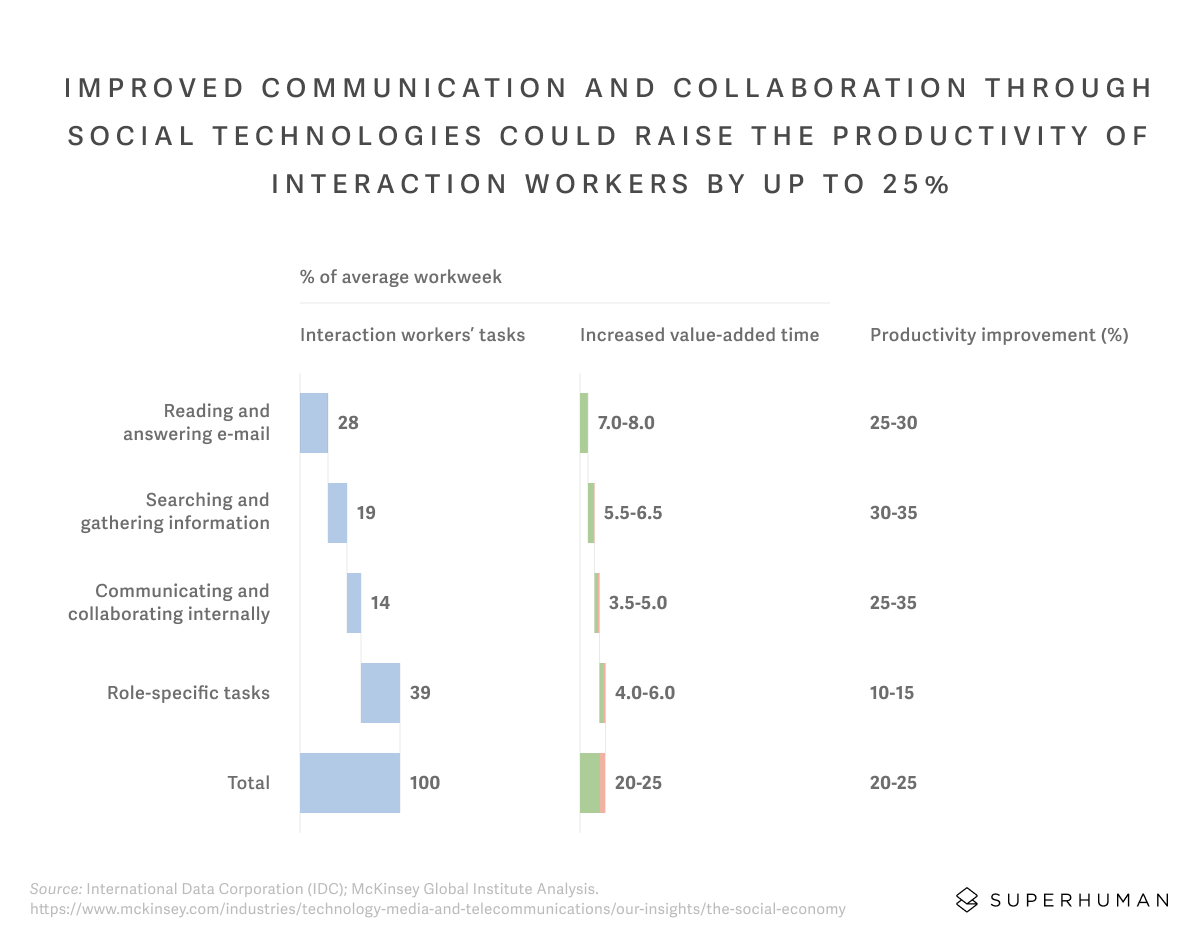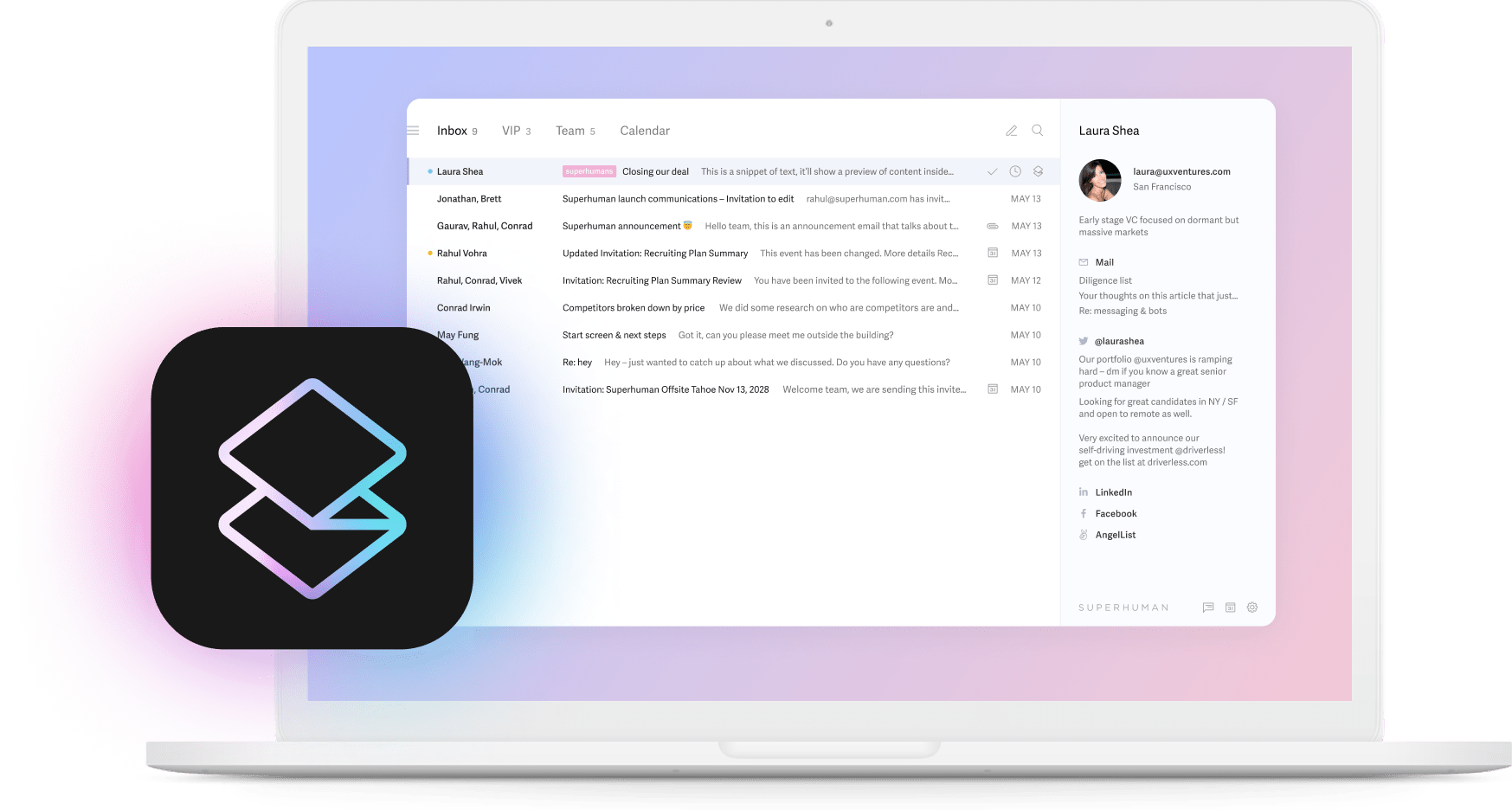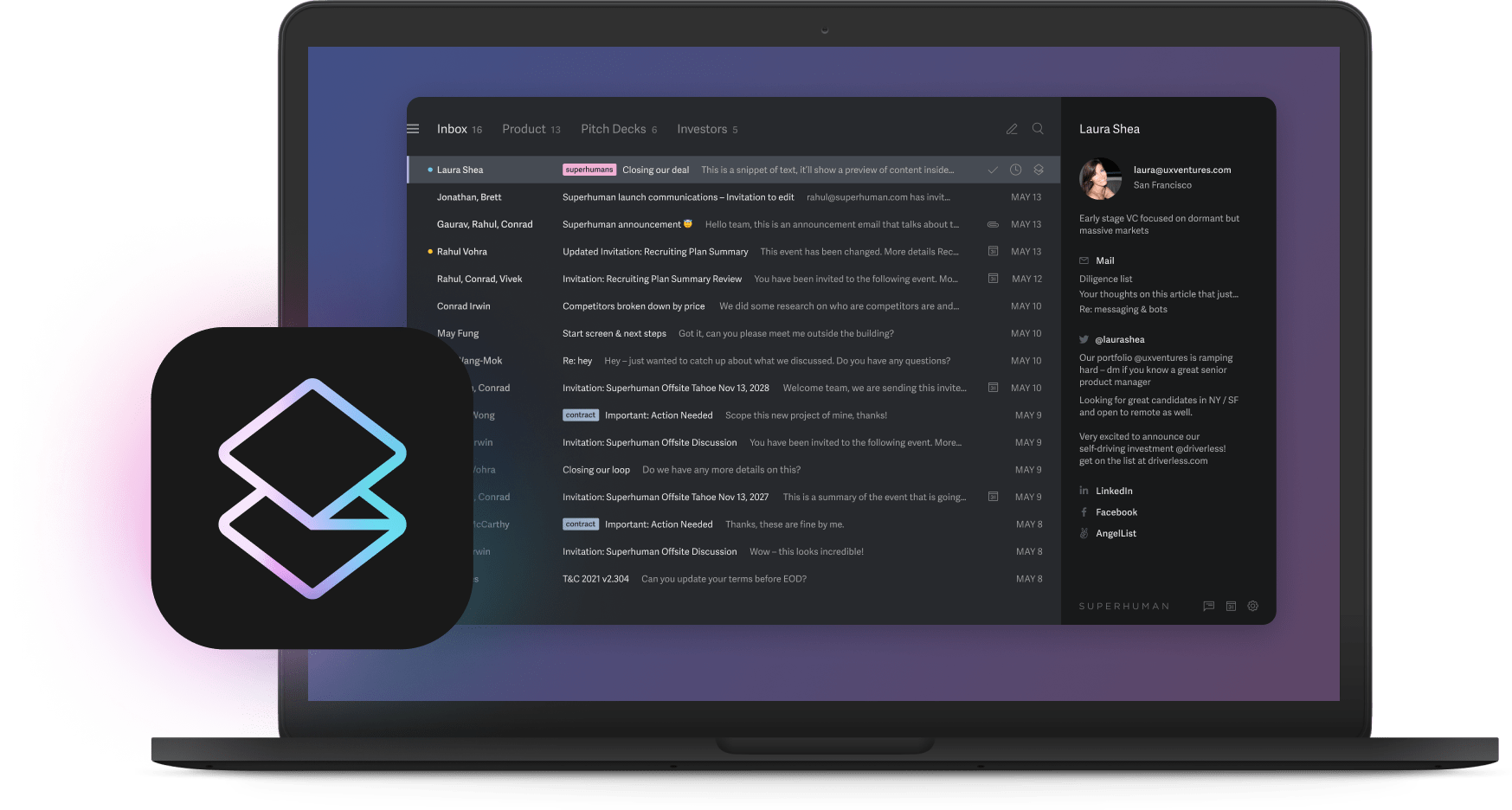
An interminable pandemic. War in Ukraine. Floods, fires, crumbling infrastructure. Rampant gun violence. An economy flirting with a recession, leading to belt-tightening, mass tech industry layoffs, and unprecedented inflation.
All this suffering comes with a hefty psychic toll. Yet the caravan of knowledge work moves on, and your team members are forced to reconcile the onslaught of frightening news with busy to-do lists, a barrage of work emails, and their own mental health as they likely grow anxious of an uncertain tomorrow.
As a leader, how do you nurture team productivity amid the chaos?
First, take a step back and consider what's most important here.
When things are this hectic, is supercharged productivity the be-all and end-all?
No.
We're not robots. And we shouldn't be expected to act like we got one of those creepy brain implants from the TV series Severance, bifurcating our work selves from the outside world. Negative emotions — like stress, despair, dread, and self-doubt — are all perfectly reasonable reactions to the seismic tragedies we're collectively reckoning with. These aren't emotions team leaders should ignore or, worse, manage away in the name of "results at all costs" performance metrics.
Productivity is still important. But it shouldn't be your sole preoccupation as a team leader. "What matters?" asked behavioral scientist Jeffrey Sanchez-Burks in the New York Times.
"Is it a career? Flexible time? Time with family? There’s a lot of discussion and thinking going on ‘What makes for a good life?’ And that, I don’t think, has landed on 'Just be productive'."
Amid so much turmoil, it's important to, above all else, lead with compassion when your team members are on the clock.
"I think that it is so important right now for leaders to be human leaders," Cisco CEO Chuck Robbins said at a Fortune event about a year into the COVID pandemic. He went on:
"Over the last few years, balancing work and life have completely blended… Issues people are facing in their personal lives — you just can't keep them out of work."
Team productivity: 13 tips for motivating colleagues when times are tough
It's a mistake to think compassionate leadership comes at the expense of a productive team. In fact, empathy improves workplace performance. Studies also show that cultivating psychological safety — or a space where employees feel empowered to speak their mind and share ideas — is vital to team success, because it allows for risk-taking, creative thinking, and an inclusive company culture.
So how do you support your colleagues and pave the way for the most productive teamwork under chaotic circumstances? Here are some helpful pointers.
Acknowledge the elephant in the room
You've likely seen that comic strip of a dog feigning a smile, insisting "this is fine", as flames engulf the room. Countless knowledge workers feel compelled to similarly delude themselves at work — performing productivity and a can-do attitude while the sky is falling in.
This shouldn't be the expectation.
As a team leader, candor goes a long way. If you're upfront about why the newest COVID variant or economic forecast is cause for potential concern, you'll make your colleagues feel less alone, and more comfortable squaring their professional obligations with their personal anxieties.
Your default leadership style may be to keep personal feelings close to the chest at work, and that's totally fine. But it may be worthwhile to show some of your own vulnerability. If you're honest about why a harrowing news item is troubling you, or how a personal matter is meddling with your focus, you empower others to speak their truth, too — which can motivate your team to better plan a path forward.
Provide supportive mental health resources
Supporting mental health at work is becoming increasingly important. According to our 2021 Workplace Wellness Report, it's a shared responsibility between employees themselves and the companies they work for. The knowledge workers we surveyed whose employers invested in mental health resources were 65% likelier to report high productivity levels. They were also likelier to say their job positively impacted their mental health.
Specific mental health resources you should consider providing for every team member include:
- Employee assistance programs
- Subsidized clinical screenings
- Self-assessment tools
- Insurance with mental health care benefits
Have regular check-ins where you're giving and receiving feedback
Even if you have an open door policy, team members may be sheepish about speaking their mind without scheduled, regular check-ins. These should be low-stakes meetings where you ask employees how they're feeling about their job, if they're facing any challenges, and whether you can do anything to help them out.
This is a great opportunity to provide support, while soliciting feedback about company policies, as they'll often have a savvy gauge on how to boost productivity.
You may disagree with your colleagues on some issues. And you should never press for personal information they don't feel comfortable sharing. But the more you lend your ear to each individual in your entire team, the more you stand to get done.
Encourage team members to take all their paid time off
American knowledge workers don't use enough vacation days. It's a shame, seeing as how time off makes you happier, more relaxed, and more creative. Vacation also improves workplace productivity and morale, and can even be instrumental in staving off burnout.
So plead with your team members to use all their PTO! Give travel tips, encourage them to share their plans with colleagues, and make sure you're marking a calendar for some R&R yourself — time you'll spend completely away from your work.
Lead by example
You can preach self-care, time management, good communication, and any productivity hacks you want to your team. But if you're not heeding the advice yourself, it won't catch on.
You want to make sure your own house is in order because your health matters, too. If you get good sleep, exercise, take time off, and carve out time in the week for the recreational activities you enjoy, you'll have enough energy to motivate your colleagues and foster more team productivity.
Take it from Luba Yudasina, CEO and cofounder of a video-related startup:
"I'm protective of my time and make it clear with my team — not only for myself — that it's important to set healthy examples."
Celebrate the wins (and lessons)
Employees want to feel valued. If they're doing a good job, you should tell them! Regular awards ceremonies recognizing achievements, email blasts after a job well done, a sincere "thank you" Slack message in the public channel — it can all go a long way towards boosting morale and keeping your team motivated. Especially in remote work environments that can make employees feel more isolated.
This kind of gratitude makes colleagues feel supported. It's also linked to better emotional wellbeing for leaders giving out thank yous themselves.
You can consider rewarding standout work with extra PTO, bonus money, or any other perk worthy of a job well done.
But Olga V. Mack, the CEO of Parley Pro, stressed in a Forbes roundtable that celebrations shouldn't just be about the wins:
"When we exclusively focus on success, we inadvertently suggest that mistakes are not valuable and should be avoided at all costs. Yet we learn as much, if not more, from our mistakes."
Mack recommends celebrating such learning experiences.
Provide opportunities for growth
Work can be a helpful distraction from societal collapse. But you need to make sure team members have enough responsibility to stay engaged, while not so much to make them feel overburdened. A great way to split the difference is by offering clear pathways for development. This could mean educational resources, mentoring or coaching sessions, or even presenting a leadership problem that's vexing you.
If your colleagues can envision not just a job, but a burgeoning career track, they'll work with a greater sense of purpose, which can improve team efficiency and even help with retention.
Set and measure goals
It's impossible to improve team productivity if you're vague about what you want your company to accomplish. Goal-setting helps you map out your biggest aspirations, as well as gauge how you can allocate workloads in order to achieve them.
As a leader, setting goals gives you a North Star to follow, but it also helps you and your team members work together to set boundaries. When you have clear-cut goals, employees know what they should focus on and what they're better off saying no to.
Strip away inessential meetings
Can it be an email? Do you have a clear agenda? Do the same two people do all the talking while everyone else looks at the floor? Quality performance hygiene usually entails the occasional meeting audit, nixing the get-togethers without a clearly-defined purpose, or the ones that are only for general company information your team members are better off reading about.
Meetings have their time and place: they're vital for brainstorming, decision-making, and information-sharing. But if left unchecked, they can be a massive distraction from the deep work needed to get things done.
Organize (optional) virtual hang out sessions
You may think this runs counter to that last point, but social gatherings can work great as meetings so long as you don't make them mandatory. Consider helming virtual coworking sessions, where participants check in for a few minutes every hour and shoot the breeze.
Outside of work hours, think team-building activities, virtual cocktail hours, murder mystery games, or anything else that'll help remote knowledge workers get to know one another, and make people feel less alone during times of such uncertainty.
Have a contingency plan
As the pandemic rages on, remote and hybrid teams should expect to face occasional COVID disruptions. It's important to map out a plan for what happens to workflows when someone tests positive for the virus, or if they're caring for a sick family member.
Consider baking in a couple cushion days when assigning project due dates, as well as figuring out what your drop-dead deadlines are and working backwards from there, giving your team some wiggle room. If someone else is picking up a sick employee's slack, make sure you guide them with any needed resources, and thank them for their help.
Also, if any of your team members work in an office, make sure they abide by the U.S. Department of Labour Workplace Guidelines to mitigate COVID's spread and keep everyone safe.
Trust your team and let them work asynchronously
One of the last things you want to do as a leader in tough times is micromanage. You always want to be privy to any roadblocks team members face so you can point them towards help, but you don't need to be asking for constant updates or monitoring whether they're online.
Employees want autonomy over how they structure their days. Give them the chance to block their calendars in ways best attuned to their work rhythms, and let go of the expectation that everyone needs to be reachable at any hour of the day — something that three quarters of remote knowledge workers worry about.
It's also worth being mindful that the remote workday can extend for longer than the traditional desk job, so make sure you're encouraging breaks throughout the day, ensuring people aren't stretched too thin.
Lighten workloads when you can
During unprecedented heatwaves, infectious disease spikes, and rampant inflation, maybe it's worth… modifying expectations a bit? You want to make sure everyone's getting their job done, but if there's anything you can take off a colleague's plate — especially if they mention they're having a hard time getting things done — see if you can help them out.
Also, during check-ins, listen to whether your team members have any thoughts on how to streamline workflows and complete tasks more efficiently. It's so easy to get married to a protocol that takes twice as long as it needs to.
Take Bolt, a Bay Area tech company that recently implemented a four-day work week. According to Jennifer Christie, their chief people officer:
"It's not about trying to cram five days of work into four days. It's really about transforming how you work fundamentally and really ruthlessly focus on the most impactful thing while still achieving your goals."
Overcoming communication challenges
One of the biggest snags on team productivity is a failure to communicate. Remote employees are often across different time zones, working at their own pace. While email, along with the eons of other messaging options, make it easy to get in touch, the constant pings can prove distracting. The constant interruptions from colleagues can impact your workforce's wellbeing and quality of work.
But without a clear-cut policy for when team members are expected to respond to each other — something 44% of knowledge workers say they don't have — the fear of missing an important update can get overwhelming.
Effective communication can bolster team productivity by 25%. So how can you improve your workspace interactions?

We put together a comprehensive guide on Communication for Hybrid Teams to flesh out how to overcome today's challenges. Here's a quick summary of some of our pointers.
Identify the pain points
Send your team members a survey asking them what ideal communication looks like for them. Questions can include:
- Favorite (and least favorite) collaboration tools
- Email and Slack habits
- Preferred channels for different communication scenarios
- Meeting expectations
- Best ways to make decisions
According to Kristen Hayward, our head of people here at Superhuman, it helps to differentiate company-wide practices from what individual team members are most comfortable with.
Emphasize Wellness
Your team's wellbeing matters, and supportive mental health resources make for a more productive work environment. A great way to promote wellness is to help save people's time by minimizing distractions.
Consider setting reply expectations so that employees won't feel the need to immediately respond to an email or Slack ping. It also helps to specify when colleagues should use email vs. when they should use separate apps for communicating. You could even allocate certain days as "focus days", where there aren't any meetings or expectations to always be available.
Make your communication handbook accessible
If a team member is confused about how to get in touch with a colleague, they should be able to quickly solicit guidance. According to Think Talent, companies with centralized communications plans are 3.5 times more likely to perform better than their peers. Such a handbook can help you emphasize your work culture, account for different team needs, and also establish timeframes for when colleagues can be expected to respond to different messages.
Consider using an intranet — like Notion, Confluence, or Lattice — to stash your handbook. If you're unsure how to get started, here's a helpful skeleton doc for you to fill in with your preference.
The email of it all: improving team productivity in your inbox
Email anxiety is real. Cluttered inboxes pose a constant threat of gumming up workflows and distracting your colleagues from work that matters, torpedoing team productivity.
It doesn't have to be like this! With the help of Superhuman, teams can transform their inboxes from a time-sucking foe into a powerful ally. Every team member can fly through their email twice as fast — saving at least three hours a week and helping them achieve that elusive Inbox Zero.


Superhuman can automatically triage your messages for you with Split Inbox, letting you reply to the most important emails quickly. It also employs dozens of keyboard shortcuts — including a "snippets" feature, that lets you quickly paste in pre-written templates for common messages — designed to save time and keep you focused on tasks that matter. Less time is spent checking messages, more time is spent collaborating with your team.
Sign up for Superhuman today to see how your team can save time and make work more manageable when the world is this chaotic.


